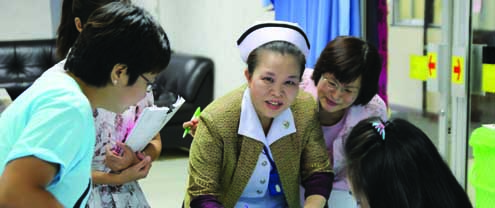Proposed
by the World Health Organization in 2009 as a possible means of controlling the
global HIV epidemic, the “test and treat” approach recommends voluntary annual
or more frequent testing for HIV and immediate antiretroviral therapy for
anyone found to be HIV-positive. With support from Merck, TREAT Asia is
organizing educational activities in advance of a “test and treat” pilot study
with men who have sex with men (MSM) and transgender women (TG) being conducted
by the Thai Red Cross AIDS Research Centre in three provinces in Thailand:
Bangkok, Ubon Ratchathani, and Lampang.
 Nurses and counselors from Lampang Hospital, Thailand, attended a test and treat workshop in June. Photo: Yongyuth Wongwichai
Nurses and counselors from Lampang Hospital, Thailand, attended a test and treat workshop in June. Photo: Yongyuth WongwichaiModeling
experiments have shown that the “test and treat” strategy has the potential to
lower HIV incidence by reducing community viral load—a population-based measure
of HIV virus levels in HIV-positive individuals in a local community. The
strategy was given further validation by the landmark clinical trial known as
HPTN 052, which showed that people with HIV who start treatment before their
immune systems are moderately damaged are 96 percent less likely to transmit
the virus to an uninfected partner.
As part
of a community preparedness and consultation component leading up to the
project, TREAT Asia held a forum in Bangkok in May 2012 to gauge MSM/TG
community leaders’ interest in “test and treat” and discuss the potential
benefits and limitations of the strategy.
Subsequent
workshops at all three sites in June provided key partners with technical
information and created an opportunity for exchanging ideas, addressing
possible issues, and facilitating the engagement of community members in the
study. Service provider attitudes toward MSM and TG were identified as a
principal barrier to the uptake of HIV counseling and testing services among
these communities. “Some providers have negative attitudes toward MSM and TG,
and therefore they do not want to provide care to this group,” said Natchanon
Srijan, coordinator of the Ubon Ratchathani Provincial Health Office. “As a
result, some MSM and TG avoid returning to the clinics and pass this negative
information on to their peers.”
To
address this, two trainings on MSM and TG sensitivity and HIV counseling and
testing are being conducted in October in Ubon Ratchathani and Lampang. The aim
of the sessions is to build sensitivity and awareness of the sexual health
needs of MSM and TG among nurses, pharmacists, medical technologists, and other
staff who will be involved in the pilot study.
Results
from the study will help to determine the acceptability of immediate treatment
after diagnosis among MSM and TG, and may be used to inform future policy on
the strategic use of “test and treat” in Thailand.